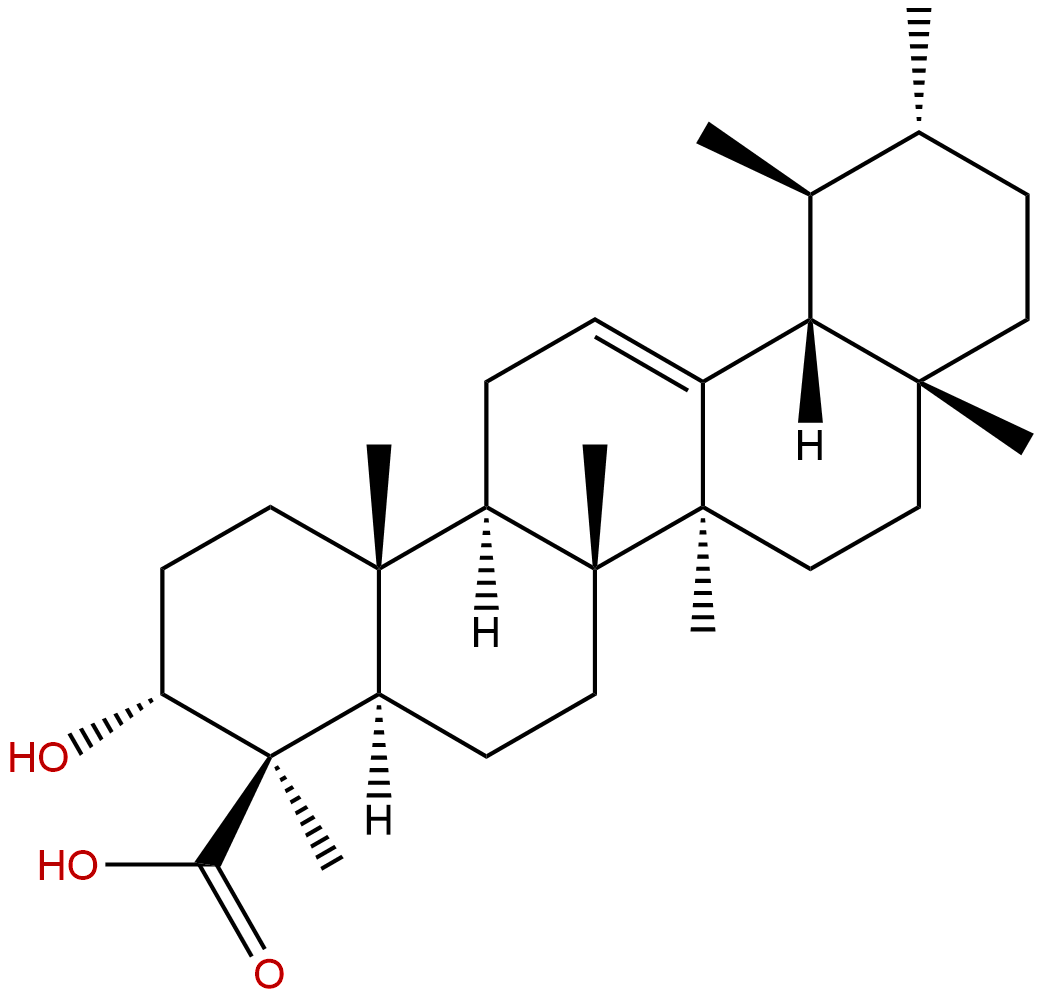
Beta-Boswellic acidCAS No.:631-69-6
|
||||||||||
 |
|
|
||||||||

| Catalogue No.: | BP0261 |
| Formula: | C30H48O3 |
| Mol Weight: | 456.711 |
Product Name: Beta-Boswellic acid
Synonym name: β-Boswellic acid; 3-Hydroxy-12-ursen-24-oic acid
Catalogue No.: BP0261
Cas No.: 631-69-6
Formula: C30H48O3
Mol Weight: 456.711
Botanical Source: frankincense (Boswellia spp.), Phellinus pomaceus and olibanum oil
Purity: 95%~99%
Analysis Method: HPLC-DAD or/and HPLC-ELSD
Identification Method: Mass, NMR
Packing: Brown vial or HDPE plastic bottle
Can be supplied from milligrams to grams.
For Reference Standard and R&D, Not for Human Use Directly.
Inquire for bulk scale.
Description:
Beta-boswellic acid and its derivatives (the major constituents of Boswellin) have anti-carcinogenic, anti-tumor, and anti-hyperlipidemic activities. Beta-boswellic acid can significantly enhance neurite outgrowth, branching, and tubulin polymerization dynamics.
References:
Neurol Sci. 2010 Jun;31(3):315-20.
The enhancement effect of beta-boswellic acid on hippocampal neurites outgrowth and branching (an in vitro study).
Increasing evidences implicate impairment of axonal integrity in mechanisms underlying neurodegenerative disorders. Beta-boswellic acid (BBA) is the major component of Boswellia serrata gum. This resin has long been used in Ayurveda (India's traditional medicine) to prevent amnesia.
METHODS AND RESULTS:
In this study, the effect of BBA was examined on neurites outgrowth and branching as well as on polymerization dynamics of tubulin. The morphometric parameters (axonal length and neuritis branching) were examined microscopically after treating the hippocampal cells with BBA. Also the assembly process of tubulin was assessed using UV/V is spectrophotometer through following of absorbance at 350 nm.
CONCLUSIONS:
The results revealed that BBA could significantly enhance neurite outgrowth, branching, and tubulin polymerization dynamics. The obtained results suggest that enhancing effect of BBA on microtubule polymerization kinetics might be the origin of increasing axonal outgrowth and branching.
BioFactors (Oxford, England)2000, 13(1-4):225-230
Anti-tumor and anti-carcinogenic activities of triterpenoid, beta-boswellic acid.
Boswellin (BE), a methanol extract of the gum resin exudate of Boswellia serrata, contains naturally occurring triterpenoids, Beta-boswellic acid and its structural related derivatives, has been used as a traditional medicine for the treatment of inflammatory and arthritic diseases.
METHODS AND RESULTS:
Topical application of BE to the backs of mice markedly inhibited 12-O-tetradecanoylphorbol-13-acetate (TPA)-induced increases in skin inflammation, epidermal proliferation, the number of epidermal cell layers, and tumor promotion in 7,12-dimethylbenz[a]anthracene (DMBA)-initiated mice. Feeding 0.2% of BE in the diet to CF-1 mice for 10-24 weeks reduced the accumulation of parametrial fat pad weight under the abdomen, and inhibited azoxymethane (AOM)-induced formation of aberrant crypt foci (ACF) by 46%. Addition of pure Beta-boswellic acid, 3-O-acetyl-Beta-boswellic acid, 11-keto-Beta-boswellic acid or 3-O-acetyl-11-keto-Beta-boswellic acid to human leukemia HL-60 cell culture inhibited DNA synthesis in HL-60 cells in a dose-dependent manner with IC50 values ranging from 0.6 to 7.1 microM.
CONCLUSIONS:
These results indicate that Beta-boswellic acid and its derivatives (the major constituents of Boswellin) have anti-carcinogenic, anti-tumor, and anti-hyperlipidemic activities.